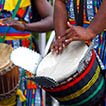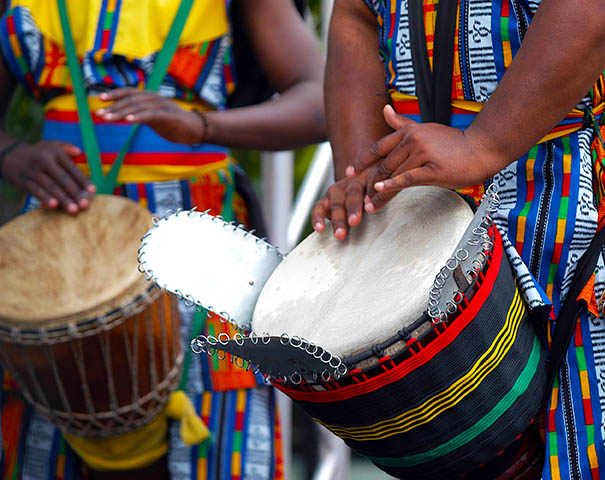Culturally-Appropriate Worship
A Cameroonian Pastor's Challenge

WAKE-UP CALL AT A SONGWRITING WORKSHOP
A few years ago I was in the Democratic Republic of Congo (DRC) for a songwriting workshop that brought together six different language groups. At the workshop a significant event happened that led me to realize more than ever before that it was time to do something for the restoration and development of our indigenous worship in a way that fits our culture.1
At the end of the workshop we had a closing celebration. As usual for such occasions, we invited some church members and leaders to attend and hear about what was done at the workshop. Their presence is usually a great source of encouragement to the participants and a powerful way to promote the purposes and goals of the workshops. Among the guests was a third-generation pastor among African pastors of the DRC. He was in the first generation of those who held a BA in theology and was in addition, at the time, an important member of the federation of churches in his region.
According to the schedule for the celebration, the workshop participants were to present songs, and several guests had been invited to speak, but the pastor was not on the program. Toward the end of the celebration, however, he insisted on taking the floor. He was amazed, he said, that he had had an opportunity there to hear the Lord being praised, not only in his mother tongue, but also with rhythms and instruments from his village. He was so overwhelmed to have this wonderful experience during his lifetime that he burst into tears, unable to control his emotions.
The pastor’s reaction was a great shock to me because, according to my African education and training, a man, especially an elderly man, must not show his tears. The fact that this man was so overwhelmed by culturally-appropriate worship that he could not control himself showed that the need for such worship in our society was critical and a serious cause for concern.
WHY IS CULTURALLY APPROPRIATE IMPORTANT?
One could ask: Why must we restore and develop culturally-appropriate worship? Do we really need to invest in that domain? How will it benefit us? Moreover, is it possible for us as Africans to achieve such a goal, considering the complexity of the task?
The term “restoration” refers to putting something back into its normal state, making all necessary repairs or adjustments. It implies that something has been damaged in some way, either consciously or unconsciously. Culturally-appropriate worship needs such restoration because of the actions and attitudes of some early missionaries during the colonial period. Some of their actions, whether right or wrong, resulted in tarnishing the image of culturally-appropriate worship, degrading and diluting it so that it came to be considered as “non-Christian.”
In this vein Paul Hiebert tells us that some early missionaries had a tendency to reject all that was not of their culture, even characterizing those values as pagan. This led them to replace local values with other values they did not consider pagan; most notably, Western values. As Hiebert says, “Drums, cymbals and other traditional instruments were replaced with organs and pianos” 2
USING OUR MUSIC AND METHODS TO WORSHIP IS PLEASING TO GOD
What is our responsibility with regard to this sad situation? We want to encourage the church and our people to understand that using our music, our instruments, and even our methods to worship the Lord is very pleasing to God. As the apostle Paul said to Timothy, all that the Lord created is good and nothing must be rejected (1 Tim 4:4). Moreover, the very first verses of the Bible tell us it was God, Elohim, who created all things from the beginning. It was not the devil, nor a people group, nor a culture that created these things (Gen 1:1). What the Lord expects from us is to receive his good creation with thanksgiving.
The story about the pastor who was so moved by culturally-appropriate worship shows us how important it is to work for the restoration of the kind of worship that takes into consideration local cultural values. It shows us, in fact, how urgent it is to develop such worship by helping us imagine the joy and freedom that can be unleashed in the hearts of local worshipers. It also enables local people to hear and receive the gospel. This is confirmed by Paul Keidel when he says that “music that speaks to the hearts of the Christians increases their desire to worship and stimulates them to talk to others about Christ, since it is in harmony with their faith.” 3
 The joy and freedom that stem from culturally-appropriate worship is, for us, the main reason to organize seminars and workshops on traditional music. Our objective is to make known and to promote the place of our cultural heritage in worshiping God. By so doing, we can help quench the thirst of the people living in larger towns who are disconnected from their traditional realities and who do not master their mother tongue, but who love traditional music.
The joy and freedom that stem from culturally-appropriate worship is, for us, the main reason to organize seminars and workshops on traditional music. Our objective is to make known and to promote the place of our cultural heritage in worshiping God. By so doing, we can help quench the thirst of the people living in larger towns who are disconnected from their traditional realities and who do not master their mother tongue, but who love traditional music.
Besides, in most of our churches, services are generally conducted in the languages of the former colonizers and worship is always in the Western form. In such a context, we want to create an interest in traditional values without of course totally rejecting Western forms of worship. That is why we can say with Brian Schrag, “I am not devaluing new, urban, or national art forms…But I am trying to promote arts and artists with few champions.” 4
THE TIME HAS COME TO ASK SOME SERIOUS QUESTIONS
Conscious of the fact that we are better placed than most of our people to communicate through our traditional music, we work hard to help them grasp that vision, to understand its relevance and the challenges at stake. This hard work is needed, despite the fact that we are in a postcolonial context. It is true that we are at a peculiar moment in history where we witness revival among Africans and the development of Afrocentrism. It is still proper and urgent, nonetheless, that we ask ourselves some serious questions:
- Do we have the means to achieve our goal?
- How far are we ready to go?
- What price are we willing to pay for the fulfillment of our dream, knowing that we cannot correct one mistake by making another mistake?
- Are our Western partners ready to trust us in the decision-making process?
- Are they ready to allow us to have our autonomy? 5









comments